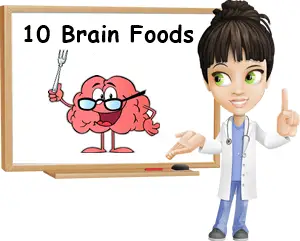Eating for a healthy brain might not be at the top of our priorities because nobody really knows how much brain health affects our daily life.
Having a healthy brain means we can think clear, talk coherently, focus on tasks and successfully fulfill them, remember everything we need to clearly, assess people and circumstances properly, coordinate our movements, enjoy emotional stability, cardiovascular benefits and so on.
But like any other organ, our brain needs nourishment too. Not providing it with sufficient amounts of the nutrients it needs means it cannot keep up its flawless activity and we might end up losing our keys often, forgetting anniversaries or appointments, not being able to focus or be productive at work or at school, finding it hard to remember things or coordinate ourselves and feeling confused and frustrated with our seemingly inexplicable incapacity to simply be sharp and efficient.

But how many of us realize that we aren’t actually supposed to go through daily life confused and frustrated at our lack of sharpness and poor memory? How many of us actually know that a good diet can improve things and both up productivity and boost mood? Because certain foods can greatly favor brain health and good brain activity and eating them on a daily basis can play a part in improving quality of life. Find out below the top 10 super foods for a healthy brain.
10 Best Brain Foods
1) Fish
About 60% of our brain’s dry matter consists of fat and the protective layer surrounding the tail of our nerve cells or neurons (the myelin sheath) is up to 70-80% fat.
Because our brain is physically made out of fats it is only natural that it needs fats in return to keep healthy and functioning.
Fish such as salmon, tuna, sardines or cod are great options for brain and nervous system health because they provide essential Omega-3 fatty acids, a particular type of fat our body does not produce, but needs to keep us alive and healthy.
Omega-3 can be found in most cold water fish species as well as several other marine life sources, but salmon, tuna, cod and sardines are great options both in term of their Omega-3 content and accessibility (see fish and seafood foods map).
2) Extravirgin olive oil
Olive oil is a particularly good food for the brain for several reasons. Firstly, it contains a plant form of Omega-3 fatty acid called alpha-linoleic acid.
While it is considered to come second after the Omega-3 forms in fish, it is still healthy and contributes enormously to good brain function and nerve cell health. In other words, both animal and plant forms of Omega-3 are healthy fats our brain feeds off and works on.

The second reason why olive oil is a good food for our brain is because of the way in which it is produced: cold pressing. This is a clean, chemical-free method and the resulting oil does not pose any health risk.
Thirdly, extravirgin olive oil has the highest-quality of all olive oils: not only is it full of flavor and has a beautiful greenish hue (a good indicative of its quality), but it is also clean, preserving all of its natural antioxidant and anti-inflammatory compounds.
3) Eggs
Our brain dry matter is about 60% fats, while the myelin sheath (the fatty protective layer surrounding our nerve cells) is up to 70-80% fats, cholesterol included, and 20-30% protein.
Eggs not only contain fats and cholesterol needed for maintaining healthy nerve cells, but also all the essential amino acids our body needs, which makes it a source of complete protein.
Even more, eggs are one of the few foods rich in choline, a nutrient directly involved in brain health. Choline is believed to improve memory and focus, reduce confusion, delay age-related cognitive decline and contribute to proper brain development of babies in the womb.
4) Nuts
What makes nuts good foods for a healthy brain is their high fat and vitamin E content. Most fats in nuts are healthy unsaturated types, with walnuts containing the healthiest of all: Omega-3.
As mentioned above, fats are basically food for our brain and a big part of it. Nuts are also a rich source of vitamin E, a fat-soluble nutrient known to protect essential Omega-3 fatty acids our brain needs from oxidation.
Being fat-soluble, vitamin E is transported in all the parts of our body requiring or containing fats, such as cell membranes, where it exerts a protective antioxidant action.
Research suggests that a sufficiently generous intake of vitamin E protects nerve cells and reduces the risk of cognitive decline associated with old age.
Vitamin E is actually a powerful antioxidant, meaning it scavenges free radicals that may damage nerve cells, hence its importance for brain health and its involvement in improving brain functions such as memory.
5) Whole grains, beans, dried fruits or nuts
Whole grains, beans, dried fruits and nuts are all good sources of dietary fiber which regulates digestion and contributes to a slower release of sugar in the bloodstream.
Stable blood sugar levels means the brain is fed sugar gradually and regularly so it neither gets overloaded, nor hungry. Think about how you feel when you work on a project for several hours.
You will suddenly feel a strong crave for something full of sugar or carbs and the sensation is so powerful that you simply can’t think or focus on the task at hand until you eat what you (your brain) crave for.
So instead of going for the tasty bag of chips, eat a handful of walnuts, almonds, two slices of whole grain bread with peanut butter or a cup of cooked kidney beans with tuna and a tablespoon or two of home-made mayonnaise. Why the “or”? Because it’s your choice where you get your fiber from.
6) Cocoa and dark chocolate
In addition to containing healthy mono and polyunsaturated fats which promote brain health by preventing fatty acid peroxidation, cocoa and dark chocolate are rich in powerful antioxidant polyphenols which have been found to prevent cognitive decline, improve memory and focus.
Moreover, their stimulant effect boosts brain function by improving blood flow to the brain, increasing energy levels and reducing fatigue. Despite being healthy foods for the brain, dark chocolate and cocoa may cause heartburn in particularly sensitive individuals as well as contribute to palpitations, extrasystoles, arrhythmia or insomnia.
7) Green tea (Camelia sinensis)
What makes green tea good for brain health is its extremely high antioxidant content as well as its stimulant properties. The antioxidants in green tea protect the brain and overall nervous system from degradation, while caffeine boosts energy, increases alertness and stimulates cognitive processes such as focus and memory.
Oolong tea and black tea are made from the same plant, but are fermented and processed whilst green tea remains unprocessed, hence its higher health value. However, consuming too much green tea can lead to side effects such as insomnia, palpitations, extrasystoles etc.
8) Ginkgo biloba
Ginkgo biloba extract has been shown to improve blood flow to the brain and, through this, contribute to relieving headaches, improving anxiety and depression.
Improved circulation can help boost memory and attention and favor learning. The leaf extract also boasts significant antioxidant action which is believed to further contribute to brain health.
However, it is best to discuss the correct dosage and possible side effects of ginkgo biloba with a medical professional first.
9) Turmeric
Curcumin, the main biologically active compound in turmeric, is an extremely potent antioxidant and anti-inflammatory.
Research suggests its anti-inflammatory and antioxidant properties may help prevent and delay nerve cell damage, reduce nerve cell loss and inflammation, all of which contribute to improved cognitive functions and brain health.
10) Water
Yes, water. Our brain is about 73% water (with about 60% of its remaining weight being fat). Not drinking enough water will have neurological side effects, just like not eating sufficient fatty acids.
When we don’t drink sufficient water, we get dehydrated. Dehydration causes low blood pressure, lightheadedness, dizziness, impaired thinking, confusion, poor movement coordination and even fainting, which is basically our brain shutting off some of its functions.
Drinking enough water, on the other hand, stimulates the sympathetic nervous system and slightly raises blood pressure, increasing alertness and, consequently, improving brain functioning.
